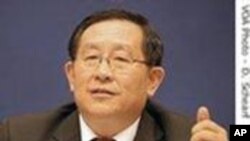<!-- IMAGE -->Clean and affordable energy is urgently needed by a world threatened with climate change and challenged by growing energy demands. A significant step forward in the quest for clean energy was taken this month by the United States and China. U.S. Secretary of Energy Steven Chu, China's Minister of Science Wan Gang and Administrator of National Energy Administration Zhang Guubao announced plans to develop a U.S.-China Clean Energy Research Center.
The Center would facilitate joint research and development on clean energy by teams of scientists and engineers from the United States and China, as well as serve as a clearinghouse to help researchers in each country. Priority topics to be addressed will initially include building energy efficiency, clean coal including carbon capture and storage, and clean vehicles. The U.S. and China together pledged $15 million to support initial activities.
"The U.S. and China are two great nations, and clean energy is one of the great opportunities of our time," said U.S. Energy Secretary Chu. "Working together, we can accomplish more than acting alone."
In an address to an audience of top scientists, faculty and students at Tsinghua University, Secretary Chu pointed to the growing threat China and the U.S. face from climate change, from extreme heat waves to declining rice and agricultural production to flooding of major urban areas in coastal regions. He stressed that dealing with climate change presents opportunities as well as challenges, including the opportunity to create millions of jobs in the clean energy sector. He also outlined a number of clean energy projects that both countries are undertaking, including developing more efficient batteries, lower cost solar cells, and commercial scale carbon capture and sequestration technologies.
The U.S.-China Clean Energy Research Center will have one headquarters in each country, at locations to be determined. U.S. and Chinese officials will discuss elements of the Center in the months ahead, with the objective of launching initial operations by year end.
Science and technology have long been a cornerstone of U.S.-China cooperation. The first agreement signed between the two nations after normalization of relations in the late 1970s was on science and technology. Today, opportunities abound for U.S.-China cooperation on clean energy technologies.
The Center would facilitate joint research and development on clean energy by teams of scientists and engineers from the United States and China, as well as serve as a clearinghouse to help researchers in each country. Priority topics to be addressed will initially include building energy efficiency, clean coal including carbon capture and storage, and clean vehicles. The U.S. and China together pledged $15 million to support initial activities.
"The U.S. and China are two great nations, and clean energy is one of the great opportunities of our time," said U.S. Energy Secretary Chu. "Working together, we can accomplish more than acting alone."
In an address to an audience of top scientists, faculty and students at Tsinghua University, Secretary Chu pointed to the growing threat China and the U.S. face from climate change, from extreme heat waves to declining rice and agricultural production to flooding of major urban areas in coastal regions. He stressed that dealing with climate change presents opportunities as well as challenges, including the opportunity to create millions of jobs in the clean energy sector. He also outlined a number of clean energy projects that both countries are undertaking, including developing more efficient batteries, lower cost solar cells, and commercial scale carbon capture and sequestration technologies.
The U.S.-China Clean Energy Research Center will have one headquarters in each country, at locations to be determined. U.S. and Chinese officials will discuss elements of the Center in the months ahead, with the objective of launching initial operations by year end.
Science and technology have long been a cornerstone of U.S.-China cooperation. The first agreement signed between the two nations after normalization of relations in the late 1970s was on science and technology. Today, opportunities abound for U.S.-China cooperation on clean energy technologies.




